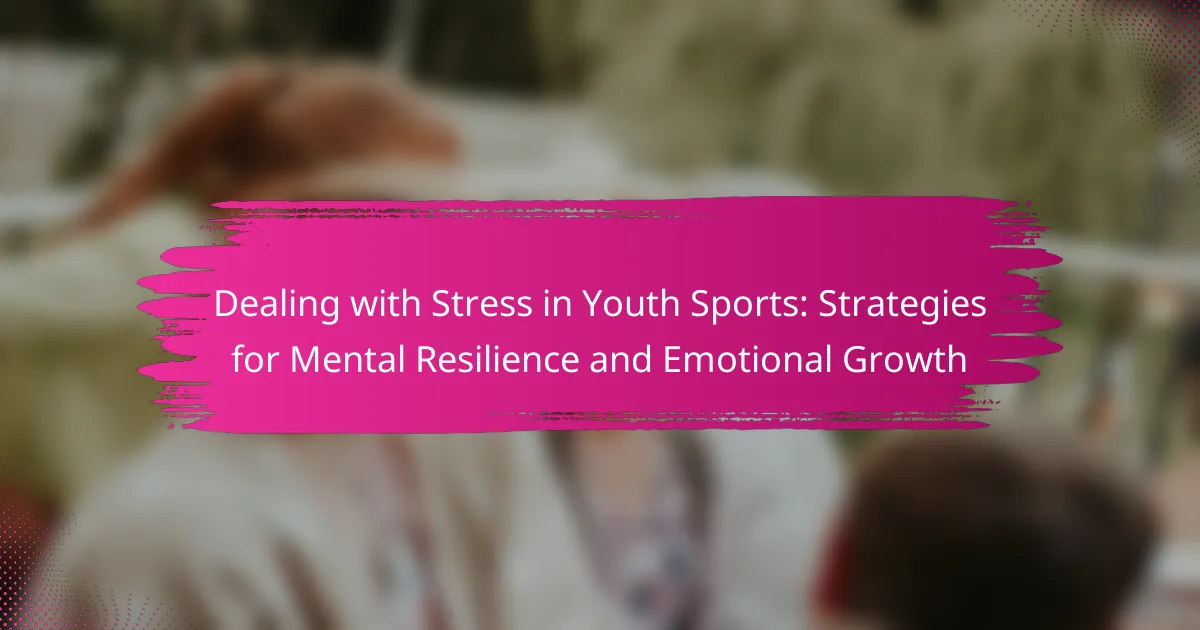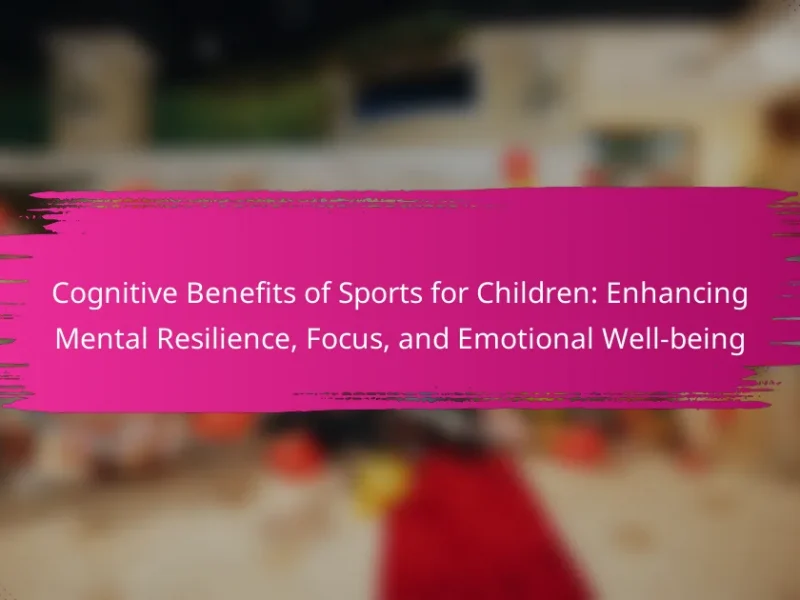Managing stress is crucial for young athletes to enhance their performance and enjoyment in sports. This article explores effective strategies for mental resilience, such as mindfulness techniques and supportive coaching. It emphasizes the importance of developing coping strategies, fostering open communication, and promoting teamwork. Additionally, emerging techniques like biofeedback are discussed to equip youth with tools for emotional growth.

How Does Stress Affect Mental Development in Youth Sports?
Stress negatively impacts mental development in youth sports by hindering emotional growth and resilience. High levels of stress can lead to anxiety, reduced performance, and decreased enjoyment of the sport. Implementing effective stress management strategies, such as mindfulness techniques and supportive coaching, can enhance mental resilience. These practices encourage emotional growth, enabling young athletes to cope better with challenges. Research indicates that athletes exposed to positive stress management techniques show improved focus and motivation, which are crucial for their overall development.
What are the common stressors faced by young athletes?
Young athletes commonly face stressors such as performance pressure, time management challenges, and parental expectations. These factors can lead to anxiety and affect their overall well-being.
Performance pressure arises from the desire to excel in competitions, often amplified by coaches and peers. Time management challenges stem from balancing sports with academic commitments, leading to stress and fatigue. Parental expectations can create additional pressure, making young athletes feel they must meet specific standards to gain approval.
Addressing these stressors is crucial for developing mental resilience and emotional growth in youth sports. Implementing strategies such as open communication, setting realistic goals, and fostering a supportive environment can help mitigate these challenges.
How does competition impact emotional well-being?
Competition can negatively affect emotional well-being by increasing stress and anxiety levels in young athletes. High-pressure environments may lead to feelings of inadequacy, impacting self-esteem. Strategies to mitigate these effects include promoting a growth mindset, encouraging teamwork, and emphasizing personal improvement over winning. Research indicates that supportive coaching can enhance resilience, fostering emotional growth.
What role does parental pressure play in youth sports stress?
Parental pressure significantly contributes to stress in youth sports, often leading to anxiety and burnout. High expectations from parents can create intense performance pressure, overshadowing the enjoyment of the sport. Research indicates that athletes experiencing parental pressure are more likely to report feelings of stress and lower self-esteem. This environment can hinder emotional growth and mental resilience, essential attributes for young athletes. Encouraging a balanced approach and emphasizing personal development over competition can mitigate these negative effects.

What Strategies Can Enhance Mental Resilience in Young Athletes?
To enhance mental resilience in young athletes, focus on developing coping strategies, fostering a supportive environment, and promoting self-awareness. Techniques such as mindfulness, goal-setting, and positive self-talk can significantly improve their ability to manage stress. Encouraging open communication with coaches and peers strengthens emotional support. Additionally, teaching young athletes to recognize their thoughts and feelings enhances their emotional growth.
How can goal-setting improve focus and reduce anxiety?
Goal-setting can significantly enhance focus and reduce anxiety in youth sports. By establishing clear, achievable goals, young athletes gain direction and motivation, which fosters concentration on their performance. This structured approach helps alleviate anxiety by shifting attention from potential outcomes to the process of improvement.
Setting specific goals encourages a sense of accomplishment as athletes track their progress. Research indicates that goal-setting can lead to increased self-efficacy, which further reduces anxiety levels. For instance, when young athletes experience success in meeting their goals, they build confidence, reinforcing their ability to handle competitive pressures.
Additionally, goal-setting promotes resilience. Athletes learn to view challenges as opportunities for growth rather than threats, enhancing their emotional development. This mindset shift is crucial in managing stress, as it allows youth to maintain focus even in high-pressure situations.
In summary, effective goal-setting strategies empower young athletes to improve focus and mitigate anxiety, fostering both mental resilience and emotional growth.
What are SMART goals and how can they be applied?
SMART goals are specific, measurable, achievable, relevant, and time-bound objectives that enhance focus and motivation. In youth sports, applying SMART goals helps athletes manage stress and build mental resilience.
For example, a youth soccer player might set a goal to improve their passing accuracy by 20% within three months. This specificity helps the athlete concentrate on a clear target, making it easier to track progress and stay motivated.
Using SMART goals fosters emotional growth by encouraging young athletes to set realistic expectations and celebrate small successes. This approach can lead to increased confidence and a healthier mindset towards competition.
Incorporating SMART goals into training sessions can create a structured environment, reducing anxiety by providing clear pathways to success. This method not only enhances performance but also contributes to overall well-being in youth sports.
What techniques promote positive self-talk and affirmations?
Positive self-talk and affirmations can be promoted through techniques such as visualization, journaling, and consistent practice. Visualization involves imagining successful outcomes, which can boost confidence and reduce anxiety. Journaling allows athletes to reflect on their thoughts and feelings, reinforcing positive narratives. Regular practice of affirmations, such as repeating empowering statements, helps internalize a positive mindset. Engaging in these techniques fosters mental resilience and emotional growth in youth sports.
How can visualization techniques help athletes manage stress?
Visualization techniques help athletes manage stress by enhancing focus and promoting relaxation. These techniques allow young athletes to mentally rehearse their performance, reducing anxiety and building confidence. Visualization can lead to improved emotional regulation, enabling athletes to cope with competitive pressures effectively. Research indicates that athletes who regularly practice visualization report lower stress levels and increased mental resilience.

What Unique Approaches Foster Emotional Growth in Youth Sports?
Unique approaches that foster emotional growth in youth sports include cultivating a supportive environment, teaching coping strategies, and promoting teamwork. These methods enhance mental resilience and help young athletes manage stress effectively. A supportive environment encourages open communication, allowing athletes to express feelings. Teaching coping strategies, such as mindfulness and visualization, equips youth with tools to handle pressure. Promoting teamwork fosters a sense of belonging, reducing anxiety and enhancing emotional stability. Together, these strategies create a holistic approach to emotional growth in youth sports.
How does team-building influence emotional resilience?
Team-building enhances emotional resilience by fostering trust and communication among young athletes. These interactions create a supportive environment, allowing players to share experiences and cope with stress collectively. As a result, participants develop stronger coping strategies and improved emotional regulation. Studies indicate that cohesive teams demonstrate higher resilience levels, emphasizing the importance of collaboration in youth sports.
What role does mentorship play in developing emotional intelligence?
Mentorship significantly enhances emotional intelligence by providing guidance and support. Mentors help youth athletes navigate stress, fostering resilience and emotional growth. Through shared experiences, they model emotional regulation and effective communication. This relationship cultivates self-awareness and empathy, critical components of emotional intelligence. As a result, young athletes develop better coping strategies and interpersonal skills, essential for both sports and life.

What Rare Techniques Are Emerging for Stress Management in Youth Sports?
Emerging techniques for stress management in youth sports focus on mindfulness, emotional regulation, and biofeedback. Mindfulness practices help athletes remain present, reducing anxiety and enhancing performance. Emotional regulation strategies teach youth to manage their feelings, fostering resilience. Biofeedback uses technology to monitor physiological responses, enabling athletes to control stress reactions. These rare techniques promote mental resilience and emotional growth, essential for young athletes.
How are mindfulness practices being integrated into training?
Mindfulness practices are increasingly integrated into training for youth sports to enhance mental resilience and emotional growth. Coaches incorporate techniques such as breathing exercises and meditation to help athletes manage stress effectively. These practices improve focus, reduce anxiety, and foster a positive mindset during competition. Research indicates that athletes who engage in mindfulness training exhibit improved performance and better emotional regulation. This holistic approach not only benefits individual athletes but also cultivates a supportive team environment.
What innovative programs are focused on mental health in sports?
Innovative programs focused on mental health in sports aim to enhance resilience and emotional growth in young athletes. Initiatives like the “Mental Health in Sports” program provide workshops and resources that teach coping strategies. Organizations such as the Positive Coaching Alliance promote positive environments that foster mental well-being. Research indicates that these programs significantly reduce stress and improve performance. Schools are increasingly integrating mental health resources into sports curricula to support athletes holistically.

What Are the Key Takeaways for Coaches and Parents?
Coaches and parents should focus on fostering mental resilience and emotional growth in youth sports. Key takeaways include promoting open communication, encouraging a growth mindset, and teaching stress management techniques. These strategies enhance athletes’ performance and well-being. For instance, regular check-ins can help identify stressors, while positive reinforcement builds confidence. Additionally, modeling healthy coping mechanisms provides youth with practical tools to handle pressure.
What best practices can be implemented to support young athletes?
To support young athletes, implement practices that foster mental resilience and emotional growth. Encourage open communication, establish a supportive environment, and prioritize balance between sports and personal life.
Promote mindfulness techniques, such as breathing exercises, to help manage stress. Provide access to mental health resources, including counselling, to address emotional challenges. Involve parents in the process, educating them on the importance of mental well-being in sports.
Create a culture that values effort over outcomes, reinforcing the idea that personal growth is more important than winning. Regularly assess athletes’ mental health and adaptability to ensure they receive the support they need.
What common mistakes should be avoided in youth sports coaching?
To avoid common mistakes in youth sports coaching, focus on fostering a positive environment, emphasizing skill development over winning, and maintaining open communication. Coaches should avoid placing undue pressure on young athletes, neglecting individual needs, and failing to teach resilience. Prioritizing mental resilience enhances emotional growth, supporting athletes’ long-term success.
How can open communication foster a supportive environment?
Open communication fosters a supportive environment by promoting trust and understanding among youth athletes. It allows for open expression of feelings, reducing stress and anxiety. This communication cultivates emotional resilience, enabling athletes to navigate challenges more effectively. Regular check-ins and feedback sessions can enhance this supportive atmosphere, encouraging growth and teamwork.


